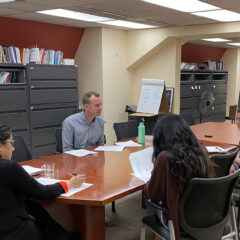Professional Development
The Department of Medical Education offers certificate programs and a variety of faculty development opportunities.
Faculty development programs and activities provided by the Department of Medical Education include workshops, seminars, and longitudinal programs. We also provide peer observation and feedback. In each of these activities, we use collaborative learning exercises and reflective practice to build the knowledge and skills that faculty need to be effective in their various teaching and educational roles.

Join Us for an Immersive, 3.5-Day Workshop Designed to Elevate Your Expertise in Knowledge Synthesis and Knowledge Translation! Heading link
This workshop is specifically crafted for educators, graduate students, researchers, librarians, and health professionals who are ready to gain cutting-edge skills in knowledge synthesis for effective knowledge translation. Over the course of 3.5 days, you’ll receive personalized guidance from expert faculty and have opportunities for hands-on experience to help you master the critical elements of this essential process. This workshop is a chance to enhance your knowledge synthesis skills in a collaborative environment, network with like-minded professionals, and leave equipped with the tools you need to make a tangible impact.
Scholars for Teaching Excellence Faculty Fellowship Heading link
The Faculty Fellowship is a program for faculty who are interested in developing their capabilities as teachers and education program leaders. The Fellowship consists of two sessions – instruction in health professions education and applied curriculum development and evaluation in health professions education.
Through participation in the Fellowship, participants develop competence in:
- Creating a learning climate in which learning is facilitated
- Using a deliberate, thoughtful approach to instructional design and curriculum development
- Communicating expectations, goals, and information in ways that stimulate and engage learners and teachers
- Tailoring communication and educational strategies to optimize learning, based on the learning context and learners’ needs
- Utilizing health professions education resources to advocate for learners and teachers, to coordinate teaching endeavors, and to optimize learning
More details about the fellowship Heading link
Fellows meet on Tuesdays from 1:30-4:30 PM. The fall session, instruction in Health Professions Education, takes place from mid-August through early December. The spring session, applied curriculum development and evaluation, takes place from January through the end of April.
The Fellows will be coached on applying what they have learned to improving their teaching and curriculum development. Participants will create a portfolio of instructional or curricular materials appropriate for their educational work. Each Fellow will present aspects of her/his portfolio during the final session of the Fellowship.
The Fellowship is an excellent career development opportunity for faculty who play important roles in student and resident education.
Details on topics
- Characteristics of effective teachers in health professions education
- Learner-centered teaching: instructional strategies for basic and clinical sciences including one-on-one teaching, small group teaching, effective lecturing, and using simulation in teaching
- Assessing, evaluating, and remediating learners
- Making sense of teaching evaluations
- Designing and conducting a needs assessment for curriculum development
- Selecting and sequencing educational activities in a curriculum
- Developing an evaluation plan for a curriculum
The process
Participation in the fellowship requires a 5% FTE commitment on the part of the Fellow’s Department and Department Head. This commitment provides assurance that the Fellow will have the time available for participation in the workshops and completion of the project. All applications must have a letter of support from the Department Head.
Fellows must attend 90% of the classroom sessions and present his/her portfolio to successfully complete the program and receive a Fellowship certificate.
An application is available upon request.
For more information, contact Alison Doubleday, Director of the Scholars for Teaching Excellence Faculty Fellowship.
Fellowship Testimonial Heading link

“I feel revitalized about my teaching. It’s very easy to start feeling overwhelmed with all your clinical and teaching duties, but when you see that other people also care about the quality of your teaching, and spend time thinking about it, you realize that there is value beyond just ‘meeting your expectations’ as teaching faculty.”
Former fellow